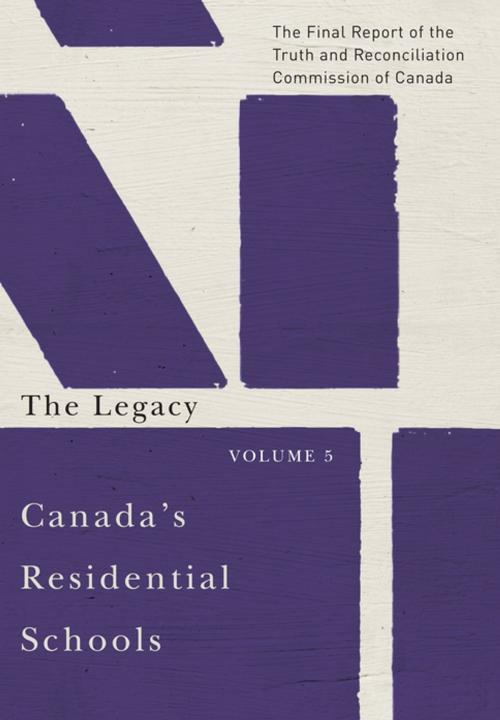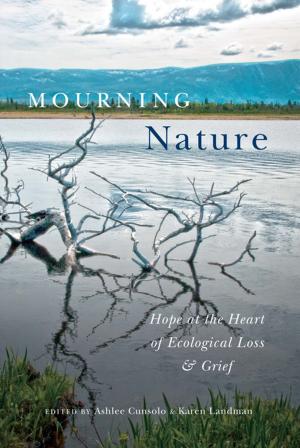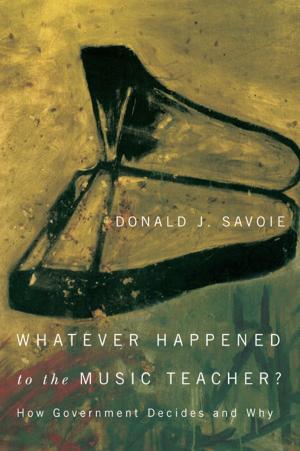Canada's Residential Schools: The Legacy
The Final Report of the Truth and Reconciliation Commission of Canada, Volume 5
Nonfiction, Social & Cultural Studies, Social Science, Cultural Studies| Author: | Truth and Reconciliation Commission of Canada | ISBN: | 9780773598287 |
| Publisher: | MQUP | Publication: | January 1, 2016 |
| Imprint: | MQUP | Language: | English |
| Author: | Truth and Reconciliation Commission of Canada |
| ISBN: | 9780773598287 |
| Publisher: | MQUP |
| Publication: | January 1, 2016 |
| Imprint: | MQUP |
| Language: | English |
Between 1867 and 2000, the Canadian government sent over 150,000 Aboriginal children to residential schools across the country. Government officials and missionaries agreed that in order to “civilize and Christianize” Aboriginal children, it was necessary to separate them from their parents and their home communities. For children, life in these schools was lonely and alien. Discipline was harsh, and daily life was highly regimented. Aboriginal languages and cultures were denigrated and suppressed. Education and technical training too often gave way to the drudgery of doing the chores necessary to make the schools self-sustaining. Child neglect was institutionalized, and the lack of supervision created situations where students were prey to sexual and physical abusers. Legal action by the schools’ former students led to the creation of the Truth and Reconciliation Commission of Canada in 2008. The product of over six years of research, the Commission’s final report outlines the history and legacy of the schools, and charts a pathway towards reconciliation. Canada’s Residential Schools: The Legacy describes what Canada must do to overcome the schools’ tragic legacy and move towards reconciliation with the country’s first peoples. For over 125 years Aboriginal children suffered abuse and neglect in residential schools run by the Canadian government and by churches. They were taken from their families and communities and confined in large, frightening institutions where they were cut off from their culture and punished for speaking their own language. Infectious diseases claimed the lives of many students and those who survived lived in harsh and alienating conditions. There was little compassion and little education in most of Canada’s residential schools. Although Canada has formally apologized for the residential school system and has compensated its Survivors, the damaging legacy of the schools continues to this day. This volume examines the long shadow that the residential schools have cast over the lives of Aboriginal Canadians who are more likely to live in poverty, more likely to be in ill health and die sooner, more likely to have their children taken from them, and more likely to be imprisoned than other Canadians. The disappearance of many Indigenous languages and the erosion of cultural traditions and languages also have their roots in residential schools.
Between 1867 and 2000, the Canadian government sent over 150,000 Aboriginal children to residential schools across the country. Government officials and missionaries agreed that in order to “civilize and Christianize” Aboriginal children, it was necessary to separate them from their parents and their home communities. For children, life in these schools was lonely and alien. Discipline was harsh, and daily life was highly regimented. Aboriginal languages and cultures were denigrated and suppressed. Education and technical training too often gave way to the drudgery of doing the chores necessary to make the schools self-sustaining. Child neglect was institutionalized, and the lack of supervision created situations where students were prey to sexual and physical abusers. Legal action by the schools’ former students led to the creation of the Truth and Reconciliation Commission of Canada in 2008. The product of over six years of research, the Commission’s final report outlines the history and legacy of the schools, and charts a pathway towards reconciliation. Canada’s Residential Schools: The Legacy describes what Canada must do to overcome the schools’ tragic legacy and move towards reconciliation with the country’s first peoples. For over 125 years Aboriginal children suffered abuse and neglect in residential schools run by the Canadian government and by churches. They were taken from their families and communities and confined in large, frightening institutions where they were cut off from their culture and punished for speaking their own language. Infectious diseases claimed the lives of many students and those who survived lived in harsh and alienating conditions. There was little compassion and little education in most of Canada’s residential schools. Although Canada has formally apologized for the residential school system and has compensated its Survivors, the damaging legacy of the schools continues to this day. This volume examines the long shadow that the residential schools have cast over the lives of Aboriginal Canadians who are more likely to live in poverty, more likely to be in ill health and die sooner, more likely to have their children taken from them, and more likely to be imprisoned than other Canadians. The disappearance of many Indigenous languages and the erosion of cultural traditions and languages also have their roots in residential schools.















